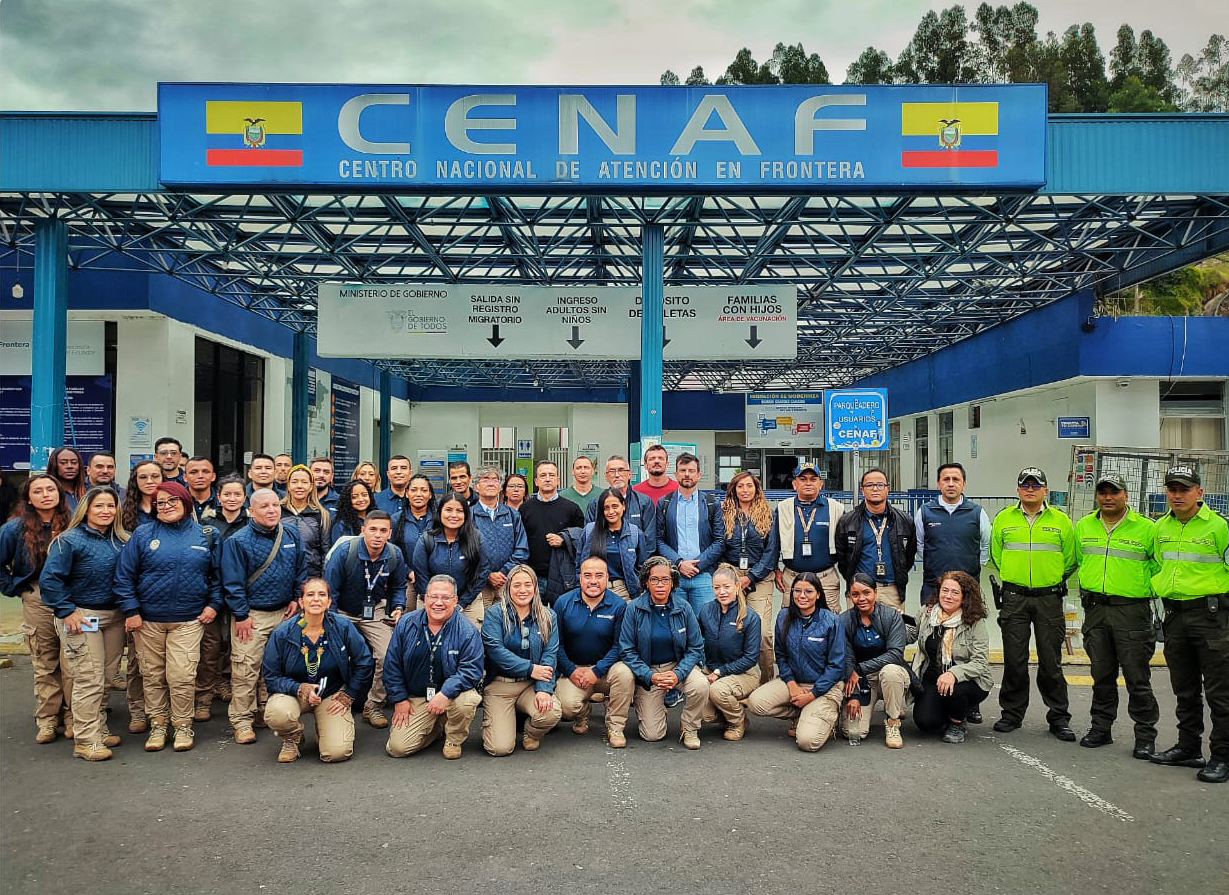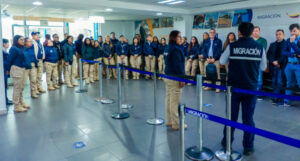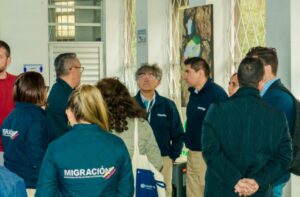-
28 August 2023
Category : Sin categorizar
Safer and more humane borders
The EUROFRONT programme analyses how training for border officials contributes to security and human rights compliance at border crossings in Latin America
 Training of officials in Rumichaca
Training of officials in RumichacaThe Rumichaca international bridge over the Guátira River is the main border crossing point between Ecuador and Colombia. Around 1,700 people pass through this area every day. Migration officials have the challenge of identifying in a very limited time whether people trying to enter the country meet the requirements, whether they may be committing a crime, or be victims of human trafficking or smuggling.
Through the European EUROFRONT programme, experts from the Spanish National Police travelled to the city of Pasto (24-28 July) to exchange knowledge with 37 Migration Colombia officials from various regions of the country. The objective of these sessions was to develop their skills in interviewing techniques on the first and second line of the border.
This activity is part of the border management training programme for migration officials from seven partner countries: Argentina, Brazil, Paraguay, Bolivia, Peru, Colombia and Ecuador. Rumichaca is one of the four pilot borders with which the programme is working, along with the Triple Border, Bermejo-Aguas Blancas and Desaguadero. The aim of these actions is to contribute to the security and protection of human rights by strengthening the effectiveness of border management.
Public expertise: Spanish National Police
José María Peche, chief inspector of the Spanish National Police’s Central Border Unit, stresses the importance of the first filter that officials make at checkpoints: “The observation of gestures and attitudes that may indicate certain anomalies, asking key questions that help clarify whether the information is true, are fundamental”. To this end, the trainers have shared with Colombian officials recommendations and protocols that allow them to carry out border inspections in the most efficient manner.

Formaciones a funcionariado de Migración Colombia “The correct application of protocols guarantees that procedures are efficient, that the rights of citizens in transit are respected and that victims of crime can be protected,” adds Peche.
Among the lessons learned are the application of impartiality, the non-criminalisation of the traveller, the acceptance of cultural differences, how to avoid prejudice and discrimination based on religion, sex, ethnicity or any other reason.
First and second line interviews
It must be underlined that frontline border officials have very little time to identify signs that may indicate irregularities. They have on average only 90 seconds to exercise this first filter. With expertise, experience and technique, they must decide whether the indications require further questioning, the so-called “second line interview“, where migration agents have the possibility to verify information.
This is why, experts explain, border interviews are not only about stopping irregular entries or detecting criminal acts. Behavioural observation is crucial for identifying citizens who may be victims of human trafficking or smuggling and facilitating their protection.
Andrés Francisco Mora has been working at the Rumichaca border for four years. The number of people in transit who have passed in front of his window is incalculable. In the words of the expert, “already the behaviour of the travellers in the queues, the gestures or the way people in groups act show that something is not right”. His and his colleagues’ expertise at the counter has made it possible to avoid several cases of minors who were going to be taken out of the country irregularly. “The training is an added value for us that helps us to do our work better,” adds Mora.
Results of cooperation

Personal experto de Migración Colombia y FIIAPP en las formaciones In short, the officials have learned how to detect identifiers of a possible victim of trafficking, what questions to ask to verify it, how to ensure respect for the rights of persons in transit and apply the gender perspective, among other contents.
In the last 14 months, around 200 Migration Colombia officials have received face-to-face training in migration management, mainly identification of false documents, or first and second line interviews. In addition, around 1,500 have completed online training on the subject, training that has also been replicated in the rest of the countries with which the Programme works.
Moisés García, Migration Colombia Representative in the Nariño Region (where the Rumichaca border is located) highlighted the importance of the capacity building that officials have been able to receive in the framework of the EUROFRONT programme: “They contribute to reinforce the institutional commitment to make borders safer and more humane”.
The views and opinions expressed in this blog are the sole responsibility of the person who write them.




